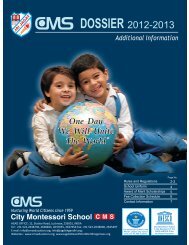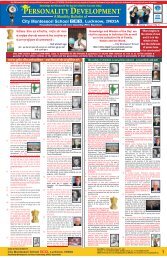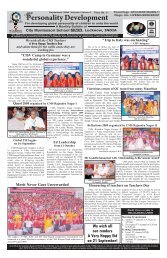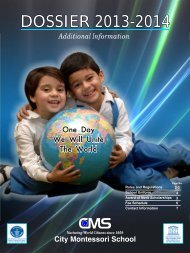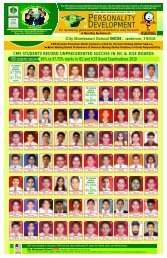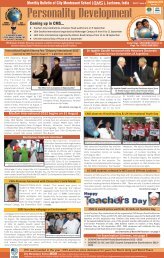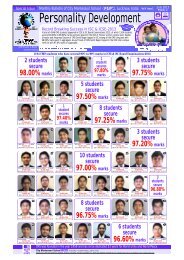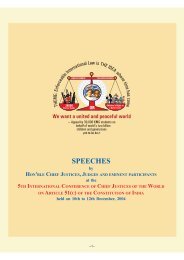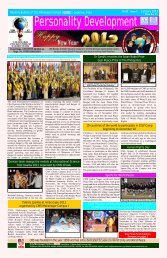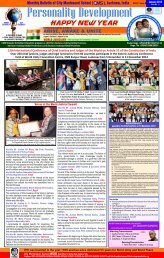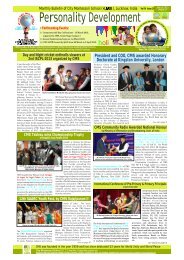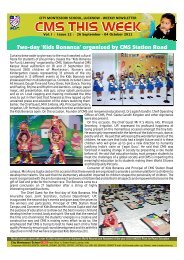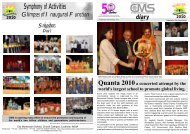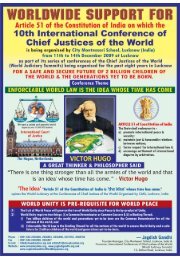11.10.07 bulletin latest Oct.07.p65 - City Montessori School
11.10.07 bulletin latest Oct.07.p65 - City Montessori School
11.10.07 bulletin latest Oct.07.p65 - City Montessori School
Create successful ePaper yourself
Turn your PDF publications into a flip-book with our unique Google optimized e-Paper software.
CMS BULLETIN - THE TURNING POINT OCTOBER 2007 (2)<br />
(Continued from page 1)<br />
amount was used by enthusiastic Jagdish<br />
to build a hall in his college which was later<br />
known as “Social Service Hall”. At that time,<br />
Jagdish was a student of Class X.<br />
16. Jagdish took admission in Mathura, the<br />
land of legendary Lord Krishna for his<br />
Class XI (Higher Secondary) studies<br />
In Mathura, Jagdish took admission in Class<br />
XI in “Champa Agarwal College”. He lived<br />
in a rented room with other students who<br />
were praying, cooking and eating together.<br />
In that college he launched a movement ‘Be<br />
A Good Student’. It was basically an attempt<br />
for starting a symbolic reform in educational<br />
system.<br />
17. Money for woollen clothes donated to<br />
sweeper for his daughters' marriage<br />
He received some money from his father to<br />
buy woollen clothes for the winter. However,<br />
Jagdish spent a major amount of this money<br />
in charity. He gave this money to a poor<br />
sweeper for the marriage of his two<br />
daughters. With the remaining money<br />
Jagdish got himself ordinary coarse clothes<br />
of thick gunny bag -'TAAT' for their cheap<br />
price. That very year Jagdish was honoured<br />
with the title of “Best Student” of the college.<br />
18. Revolutionary Raja Mahendra Pratap<br />
inspired Jagdish to work for a World<br />
Government<br />
Raja Mahendra Pratap motivated Jagdish to<br />
serve the entire humanity. When Jagdish<br />
called on Raja Mahendra Pratap in his Prem<br />
Mahavidyalaya College, Vrindavan, the later<br />
presented a copy of his 4 page Hindi<br />
monthly publication titled 'Sansar Sangh'<br />
(World Union) which he himself published<br />
and printed. Raja Mahendra Pratap had<br />
founded an institution, Prem Mahavidyalaya<br />
in Vrindavan. The monthly magazine inspired<br />
Jagdish to form a “World Union” and<br />
systematically strive for “World Unity”.<br />
19. Jagdish came to Lucknow as a student<br />
but decided to stay on and make it a centre<br />
of World Unity Education<br />
Jagdish Gandhi took admission in Lucknow<br />
University for B.Com studies in July 1955.<br />
He took shelter in a small temple on the bank<br />
of Gomti River, as he had no money to stay<br />
in a hostel or a rented accommodation. He<br />
started teaching children in exchange of one<br />
or two chapatis (Indian bread) and thereafter<br />
decided to own a little money by way of<br />
tuitions. Not only did he teach the prescribed<br />
subjects but also preached the value of<br />
World Unity, Brotherhood and Oneness of<br />
Mankind to his pupils.<br />
20. Got into students' politics and was<br />
elected Union President<br />
He became very popular with students and<br />
was elected Vice-President of Lucknow<br />
University Students Union in 1957 when he<br />
was in M.Com first year. In 1958, while he<br />
was in M.Com Part II Jagdish Gandhi won<br />
the Students’ Union election for President<br />
with a thumping majority. He contested both<br />
elections through his personal contacts and<br />
immense goodwill without spending a single<br />
penny.<br />
21. Marriage with Bharti<br />
During this time, Jagdish came in contact<br />
with a young girl, Bharti, at a spiritual<br />
gathering (Satsang). Bharti was then<br />
studying for a degree in Master of Education<br />
(M.Ed) at Lucknow University. They met<br />
again at a religious congregation organised<br />
in honour of Jagatguru Sankaracharya<br />
Nardanand Saraswati’s visit to Lucknow.<br />
Both got attracted to each other’s spiritual<br />
leanings. Jagdish Gandhi presented three<br />
books written by Mahatma Gandhi and Sant<br />
Vinoba Bhave to Bharti. These books were<br />
(1) 'Sewa ki Pagdandi' (The Path of Service)<br />
(2) 'Stree Shakti' (Women Power) and (3)<br />
'Geeta Pravachan' (Preaching of the Geeta).<br />
Both held similar views on spirituality and<br />
both aspired to serve society by imparting<br />
meaningful education to children. Soon,<br />
Jagdish and Bharti got married and tied the<br />
knot on 15 January 1959.<br />
22. Marriage attended by Governor V.V. Giri<br />
The dowryless, simple marriage ceremony<br />
was attended by His Excellency V.V. Giri, the<br />
then Governor of Uttar Pradesh who later<br />
became the President of India. The marriage<br />
was also attended by the then Chief Minister<br />
of the State, Dr Sampurnanand, members of<br />
state cabinet, university professors,<br />
educationists and a large number of<br />
students.<br />
23. No marriage feast, but sugar candy<br />
distributed to invitees<br />
The marriage was solemnized with the<br />
recitation of Vedic Hymns (Mantras) by a<br />
friend and Sanskrit teacher by taking seven<br />
rounds of the sacred fire by the couple. The<br />
guests were offered crushed candy (Mishri)<br />
powder in place of feast, which the young<br />
couple could not afford. Jagdish and Bharti<br />
addressed the gathering taking a vow that<br />
they would serve society by imparting<br />
meaningful education to children.<br />
24. 'World marries India'<br />
Governor V.V. Giri, attended the marriage and<br />
gave his blessings to the couple with the<br />
words “Jagdish (World) weds Bharti (India).<br />
May God bless the couple!,” he said. The<br />
gathering clapped in appreciation of the<br />
comparison.<br />
25. The couple dedicated themselves to<br />
make education a medium for social<br />
transformation<br />
Jagdish and Bharti Gandhi laid the<br />
foundation of <strong>City</strong> <strong>Montessori</strong> <strong>School</strong> on<br />
1st July 1959 in their hired house at 12,<br />
Station Road, Lucknow. This house on a rent<br />
of Rs. 64/- per month was allotted to Jagdish<br />
Gandhi by the then District Magistrate of<br />
Lucknow, Mr K.C. Mittal, IAS. He was the<br />
same District Magistrate who allowed<br />
Jagdish with his 50 members to clean the<br />
city of Aligarh and thereafter awarded a cash<br />
prize of Rs. 4,600/- to the social service group<br />
for cleaning Aligarh city. For 15 days no<br />
student came to take admission. On 16th July,<br />
Bharti Gandhi requested her neighbour,<br />
Jasoda Devi Agarwal, wife of Sohan Lal<br />
Agarwal, to be good enough to send their<br />
children to her school. Jasoda Devi Agarwal,<br />
was impressed by the Gandhi couple’s<br />
dedication towards children’s education and<br />
sent five children of their joint family with<br />
an advance monthly fees of Rs. 25/-. Jasoda<br />
Devi’s husband Sohan Lal Agarwal was<br />
requested to inaugurate the school. At the<br />
time of inauguration of the school there were<br />
only 5 children apart from Mr and Mrs Sohan<br />
Lal Agarwal and Mr and Mrs Gandhi. Sohan<br />
Lal Agarwal was a great philanthropist. He<br />
inaugurated the school and gave Rs. 1000/-<br />
as donation. The school purchased<br />
furniture, toys, books and other items with<br />
this money.<br />
26. Jagdish Gandhi elected MLA in 1969<br />
Jagdish Gandhi was elected as a Member of<br />
Uttar Pradesh State Legislative Assembly<br />
as an independent candidate from Aligarh<br />
district from (1969 to 1974). Only 11<br />
independent members from the state were<br />
elected for the State Assembly.<br />
27. Elected President of U.P. Progressive<br />
Independent Legislators Party<br />
Jagdish Gandhi formed a Uttar Pradesh<br />
Progressive Independent Legislators Party<br />
and was unanimously elected its President.<br />
The same year in 1969, President of India,<br />
Shri Zakir Hussain, died and hence election<br />
process for a new President was started.<br />
Jagdish Gandhi put up a proposal to his<br />
party to support the candidature of V.V. Giri,<br />
the then Vice President of India, for<br />
Presidentship, provided he agreed to<br />
contest the election as a non-party<br />
(independent) candidate.<br />
28. Jagdish Gandhi wanted President of a<br />
democratic country as a non-party person<br />
Jagdish was of the opinion that since the<br />
President is the representative of the whole<br />
country and protector of the constitution,<br />
he should not represent any political party.<br />
He strongly felt that the candidate should<br />
be a non-party person of integrity and<br />
character and should normally be elected<br />
unopposed and should be an independent<br />
candidate. He put his proposal before his<br />
party (Legislator’s group) and suggested<br />
that V. V. Giri resign from Congress Party<br />
and then contest for the highest office of<br />
the country as a non party independent<br />
candidate and that he should not seek<br />
approval of Congress Party for his<br />
candidature. This proposal was accepted by<br />
his party unanimously and it was decided<br />
that V.V. Giri should be apprised of the<br />
decision and advised to resign from<br />
Congress Party to seek election as an<br />
independent candidate and Jagdish Gandhi<br />
be sent to New Delhi for advising him<br />
accordingly.<br />
29. Close friendship with Governor V.V.<br />
Giri<br />
Jagdish Gandhi knew V.V. Giri very well, ever<br />
since he was President of Lucknow<br />
University Students Union and V.V. Giri was<br />
the Governor of Uttar Pradesh. When<br />
Jagdish Gandhi got elected as President of<br />
Lucknow University Students Union, he<br />
requested the then Prime Minister of India,<br />
Jawahar Lal Nehru, to inaugurate his<br />
Students Union. He agreed and came to<br />
Lucknow to inaugurate the students union.<br />
Failure is the only opportunity to begin again, more intelligently.<br />
V.V. Giri, also attended the inaugural<br />
ceremony and he had also attended Jagdish<br />
Gandhi’s wedding. Later, when V.V. Giri was<br />
appointed as Vice-President of India, Jagdish<br />
often met him in New Delhi.<br />
30. Morarjee Desai once stayed with Jagdish<br />
at the latter’s residence in Lucknow<br />
Jagdish Gandhi went to Delhi to meet V.V.<br />
Giri in connection with the presidential<br />
election. But before meeting V.V. Giri he<br />
decided to meet Morarji Desai, the then<br />
member of the working committee of All India<br />
Congress Committee on 12th May 1969, to<br />
find out whether Congress Party would give<br />
a party ticket to V.V. Giri to contest the election<br />
for the President’s post or it had made up its<br />
mind to give the ticket to someone else.<br />
Therefore, Jagdish Gandhi first met Morarji<br />
Desai as he knew him well. Morarji Desai<br />
was constrained to resign as Finance<br />
Minister of the country under Kamraj Plan.<br />
Morarji Desai was President of All India<br />
Prohibition Committee and Jagdish Gandhi<br />
was the President of the U.P. State<br />
Prohibition Committee. As President of the<br />
State Prohibition Committee, he invited<br />
Morarji Desai to Lucknow to inaugurate the<br />
State Prohibition Conference. Morarji Desai<br />
accepted the invitation and stayed with the<br />
Gandhis at their residence at 12, Station<br />
Road, Lucknow and had meals with them,<br />
cooked by Bharti Gandhi.<br />
31. Jagdish Gandhi disappointed with<br />
Morarji Desai’s reply<br />
At Delhi, when asked about the Congress<br />
Party candidate to be fielded for President’s<br />
election, Morarji Desai quipped “It will be<br />
decided in Congress Working Committee<br />
Meeting to be held at Hyderabad on 27 May<br />
1969.” Jagdish Gandhi asked him whether<br />
they would consider the candidature of V.V.<br />
Giri, Vice President, for the post of President.<br />
To this, Morarji Desai replied that he was<br />
too old to be the President of India. It was<br />
clear to Jagdish that the capitalist lobby of<br />
Congress Party headed by Morarji Desai<br />
would oppose V.V. Giri, who was supposed<br />
to belong to the socialist lobby.<br />
32. Congress Working Committee divided<br />
into two camps<br />
At that time Congress Working Committee<br />
was divided in two camps. One camp had<br />
leanings towards the capitalist lobby and<br />
the other towards the socialist lobby. There<br />
were seven members of Congress Working<br />
Committee, out of which four members were<br />
considered as the members of the capitalist<br />
lobby and the other three belonging to the<br />
socialist lobby. Morarji Desai was<br />
considered the leader of the capitalist lobby<br />
and Indira Gandhi as leader of the socialist<br />
lobby. Jagdish Gandhi got an impression that<br />
V.V. Giri would not be given ticket to contest<br />
for Presidentship.<br />
33. Jagdish Gandhi's advice to V.V. Giri<br />
After meeting Morarji Desai, Jagdish Gandhi<br />
went to President’s house to meet V.V.Giri<br />
who was then the Acting President, apart<br />
from being the Vice-President of India.<br />
Jagdish Gandhi advised him to resign from<br />
Congress Party and contest for President’s<br />
election, as an independent candidate, as<br />
the President of the country was the<br />
representative of the entire country and<br />
should not belong to any particular political<br />
party. The President is a protector of the<br />
Constitution and its sentinel. Hence, he<br />
should be an independent candidate.<br />
34. V.V. Giri unwilling to resign from<br />
Congress Party<br />
V. V. Giri told Jagdish that he was nearly 75<br />
years old. He had been in Congress Party<br />
right from childhood for nearly 60 years and<br />
Congress was in his blood. ‘I will not resign<br />
from Congress Party’, he declared. Jagdish<br />
Gandhi told Giri that he doubted if he would<br />
get the party ticket for contesting the<br />
President’s election. Therefore, he should<br />
resign from the Congress Party and decide<br />
to contest President’s election as an<br />
independent candidate before his<br />
candidature was rejected by the majority of<br />
members of the Congress Working<br />
Committee.<br />
35. V.V. Giri confident of getting Congress<br />
Party ticket<br />
V.V. Giri told Jagdish that there were two Vs<br />
in his name. First V stood for victory in<br />
getting Congress ticket for Presidentship<br />
and second V stood for victory in election<br />
for the post of the President of India. Yet<br />
Jagdish persisted in his plea to contest as<br />
an independent candidate.<br />
36. Jagdish Gandhi’s views published<br />
But V.V. Giri did not agree and Jagdish<br />
returned to Aligarh disappointed. His friend<br />
— Henry Ford<br />
Madan Lal Hitaishi, Editor of Dainik Prakash,<br />
a daily newspaper published from Aligarh<br />
published full details of the conversation<br />
between Jagdish Gandhi and V.V. Giri in his<br />
daily ‘Dainik Prakash’ of 15 May, 1969 issue.<br />
37. Turn of Events — a call from<br />
Rashtrapati Bhavan<br />
After 15 days on 27th May 1969 at 5.00 pm<br />
in the evening Jagdish got a phone call from<br />
Jagannath Sahai, Additional Private<br />
Secretary to the President of India, that there<br />
was disquieting news from Hyderabad that<br />
V.V. Giri had not been given the Congress<br />
ticket. "It is sad news and Shri V.V. Giri is<br />
very much perturbed", he said. "He has asked<br />
you to come to Delhi by the earliest available<br />
flight and meet him immediately", he pleaded.<br />
But there was no flight available for Delhi<br />
that day. Jagdish told him that he would<br />
travel by night train and reach Delhi by 7.00<br />
am next morning. Jagdish Gandhi reached<br />
New Delhi station on 28th May 1969 at 7.00<br />
am. Shankar Giri and Bhaskar Giri, two sons<br />
of VV Giri, were there at the station to escort<br />
him to President’s House.<br />
38. Ultimately Mr. Gandhi convinced<br />
V.V. Giri to contest as an independent<br />
candidate and resign from the Congress<br />
Party<br />
After much persuasion, consultations and<br />
discussions with the family members of V. V.<br />
Giri including his wife, Saraswati Giri, sons<br />
Shankar Giri and Bhaskar Giri, daughter in<br />
law Mohini Giri, wife of Bhaskar Giri, Jagdish<br />
Gandhi, got him to resign from the Congress<br />
Party and contest as an independent<br />
candidate for the post of President against<br />
the official Congress candidate. Only a few<br />
days before the election, Indira Gandhi also<br />
declared that as per her conscience she<br />
would support V.V. Giri and advised other<br />
members of her group accordingly.<br />
39. V.V. Giri elected President of India<br />
Shri V.V. Giri an independent candidate was<br />
elected as President of India, defeating the<br />
official Congress candidate. Jagdish Gandhi<br />
was very happy that his mission was<br />
accomplished as the country got an<br />
Independent President, who was not a<br />
nominee of any Political Party.<br />
40. Jagdish visits London in 1972, to study<br />
the democratic system of governance of<br />
England and parliamentary procedures of<br />
the British Parliament<br />
A.G. Kher, Speaker of U.P. Assembly and<br />
Narain Dutt Tewari, the Chief Minister of<br />
U.P., selected Jagdish Gandhi to visit<br />
London in 1972 to study the democratic<br />
system of governance of England and<br />
parliamentary procedures of the British<br />
Parliament on behalf of the U.P. Government.<br />
41. 'India International Club' founded and<br />
2nd International Youth Conference<br />
organised in London<br />
Jagdish Gandhi founded the 'India<br />
International Club.' Under the auspices of<br />
this club a 3-day long 2nd International<br />
Youth Conference was organized in Victoria<br />
Hall, Middlesex (London). This conference<br />
was held on 17, 18 and 19 December 1974.<br />
With the help of the ruling Labour Party, the<br />
conference deliberated upon the topic<br />
“World Peace through Education.” Prior to<br />
it, Mr Gandhi had organized the first<br />
International Youth Conference at K.D. Singh<br />
Babu Stadium in Lucknow in 1973 along with<br />
14 th All India Children & Youth Festival which<br />
he had been organizing every year, for the<br />
past 14 years. In the conference held in<br />
London representatives of 47 countries<br />
participated. These participants included<br />
statesmen, diplomats, members of high<br />
commissions, members of embassies and<br />
students and teachers of various universities<br />
of England.<br />
42. Jagdish embraced Baha’i Faith with a<br />
vow to serve humanity<br />
When the adherents of Baha’i Faith<br />
expressed their views (in the London Youth<br />
Conference), Mr. Gandhi was deeply<br />
impressed with their spiritual philosophy. It<br />
was maintained by the Founder of Baha’i<br />
Faith, Lord Baha‘u’llah, that the “Earth is<br />
but one country and the mankind its<br />
citizens”. Baha’i Faith believes that God is<br />
One, Religion is One and Mankind is One.<br />
Baha’i Faith believes that the entire humanity<br />
must be united. Gandhi was already a<br />
promoter of “World Unity” and for this<br />
reason he accepted the Baha’i Faith in<br />
London. From then on, Jagdish has been<br />
striving to make children of his school a Gift<br />
of God to Mankind and a Pride of the Human<br />
Race and a potential Light of the World.<br />
(Continued on page 3)



